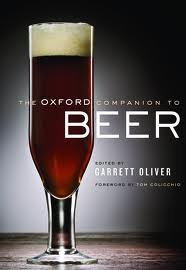 I know that half the world has already reviewed the Oxford Companion to Beer, the voluminous tome edited by Garrett Oliver supposedly about everything beer. It is organized more like an encyclopedia (alphabetic entries) than a coherent book. A review at such a late date may seem pathetic – but I have my reasons.
I know that half the world has already reviewed the Oxford Companion to Beer, the voluminous tome edited by Garrett Oliver supposedly about everything beer. It is organized more like an encyclopedia (alphabetic entries) than a coherent book. A review at such a late date may seem pathetic – but I have my reasons.
You see, I received my copy shortly after it came out, and shortly before my website got hacked. I had originally planned to write about it quite quickly, but by the time I wrestled control of my website back and re-built it, that horse had left the barn. The beer blog world was ablaze with reviews – both glowing and glowering. Plus the temperature had gotten a tad hot with accusations and defensiveness flying back and forth (not sure what I am talking about? Try going here, here and here for just the tiniest snippet of the vitriol that surounded it). In that environment, there was no way I was wading in.
So I bid my time. And what a genius decision that was. Because while I was biding I tried to use the book for what it is meant to be – a quick reference. When I needed to check a fact or confirm a tidbit, I pulled the Oxford off the shelf to see what it would say. I have only read the tiniest fraction of the entries, but I can be confident in saying it is well into three digits at this point. And so I feel like I can safely offer my opinion on the book.
My overall assessment is that a book like this can never win – even with me. At times it doesn’t have enough detail. At others it goes on too long. And then there are the little inaccuracies that can irritate. There are a million different ways to critique this book. But what I figured out is that it isn’t the book’s fault – it is mine. Sometimes I am looking for a detailed explanation of a chemical process and it falls short. Other times I just need a quick hit and find it gives me too much. In the areas I know well (such as the entry on Canada) I can nitpick the details and grumble at where it gets it wrong. Other times, when it is a new topic for me, the entry can fly far above my head.
You see what I mean? That isn’t a shortcoming of the book. It is the inconsistency of what I want from the book. Sometimes I want more, sometimes less. How are the contributors supposed to anticipate what I want? Well, of course they can’t. And that is the point.
The book does exactly what it is supposed to achieve. It offers a brief overview of thousands of beer-related topics. Yes, they are imperfect. But so is Wikipedia. And I don’t here of people trashing Wikipedia for its inaccuracy and uneven reliability. That is because everyone knows Wikipedia is uneven and at times inaccurate, and we adjust our expectations accordingly.
Many, if not most, of the reviews I have read come from the author’s particular perspective (which is both fair and expected). But it means they measure it against their own body of knowledge. In particular the historians are picking the book apart. I have no doubt they are right. But maybe they miss the point. Yes, there are historical inaccuracies – I found some myself. And that is a shame. But in the big picture how important are those mistakes. The book gets 1000 things right for every two it gets wrong. I will take that record anytime.
I realize I have not yet really discussed the book and my reaction. So here it is. I am very glad I bought it. The entries are well written and concise. Naturally it is well organized (alphabetical – duh!). The range of topics is exhaustive and impressive. At times I have been thrilled it is beside my desk. At others it has frustrated me. What that tells me is that I need to learn how to use it. Like any tool it will work for me in the right moments. But like any tool I cannot use it for everything. I believe that over time I will figure out when it is most useful to me.
I respect the men and women who worked to put it together. What an ambitious project! But I also respect those who are criticizing it for its failings. Everyone needs constructive criticism to push them to be better. But this is an important book for the beer world. We need this compendium of knowledge, regardless of how flawed it might be.
The most appropriate part of the book’s title is “companion”. It reflects what the book is. We don’t ask our companion to do everything for us (that would be a slave). We ask them to support us when we need them, and we promise to give something back in return. I am not sure what I need to give back to the Oxford, but I am certain I will only ask of it what it is capable of giving to me.
That is my two cents on this. Feel free to disagree. But I plan on consulting the book as needed for many, many years.

Leave a Reply